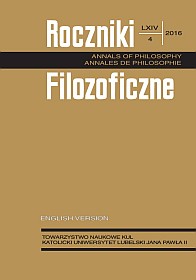Possibilities for Divine Freedom
Abstrakt
O możliwościach Bożej wolności
W artykule przeprowadzam analizę trzech ujęć Bożej wolności. Staram się wykazać, że dwa teoretyczne ujęcia, które pojawiły się ostatnio i które próbują wyjaśnić Bożą wolność, nie odwołując się do koncepcji alternatywnych możliwości, nie osiągają postawionego sobie celu. Następnie pokazuję, w jaki sposób wizja Bożej wolności oparta na idei Roberta Adamsa, że Boża łaska oznacza, iż nie jest on zobligowany, by koniecznie stwarzać najlepszy z możliwych światów, jest zdolna wyjaśnić, w jaki sposób Bóg może być wolny, a zarazem doskonale dobry i rozumny.
Bibliografia
Adams, Robert M. “Must God Create the Best?” The Philosophical Review 81, 3 (1972): 317. doi:10.2307/2184329.
Couenhoven, Jesse. “The Necessities of Perfect Freedom.” International Journal of Systematic Theology 14, 4 (2012): 396–419. doi:10.1111/j.1468-2400.2011.00622.x.
Couenhoven, Jesse. Stricken by sin, cured by Christ: Agency, necessity, and culpability in Augustinian theology. USA: Oxford University Press, 2013.
Couenhoven, Jesse. “The probelm of God's Immutable Freedom.” In Kevin Timpe. Free will: Sourcehood and its alternatives, 294–310. 2nd ed. London, New York: Bloomsbury Academic, 2013.
Dolezal, James E. God without parts: Divine simplicity and the metaphysics of God’s absoluteness. Eugene, Or.: Pickwick Publications, 2011.
Frankfurt, Harry G. “Alternate Possibilities and Moral Responsibility.” Journal of Philosophy 66, 3 (1969): 829–39.
Garcia, Laura L. “Divine Freedom and Creation.” The Philosophical Quarterly 42, 167 (1992): 191–213.
Hefner, Philip J. “The Creation.” In Christian Dogmatics: Volume 2, edited by Carl E. Braaten and Robert W. Jenson, 269–362. Philadelphia: Fortress Press, 1984.
Howard-Snyder, Daniel, and Frances Howard-Snyder. “How an Unsurpassable Being Can Create a Surpassable World.” Faith and Philosophy 11, 2 (1994): 260–68. doi: 10.5840/ faithphil199411222.
Kittle, Simon. “Robustness and up-to-us-ness.” Disputatio (forthcoming).
Kittle, Simon. “Abilities to do otherwise.” Philosophical Studies 172, 11 (2015): 3017–35. doi: 10.1007/s11098-015-0455-8.
Levy, Neil. “The Good, the Bad, and the Blameworthy.” 1, 2 (2005): 2–16.
McFarland, Ian A. “'Willing Is Not Choosing': Some Anthropological Implications of Dyothelite Christology.” International Journal of Systematic Theology 9, 1 (2007): 3–23. doi: 10.1111/j.1468-2400.2006.00227.x.
McFarland, Ian A. “Fallen or Unfallen? Christ's Human Nature and the Ontology of Human Sinfulness.” International Journal of Systematic Theology 10, 4 (2008): 399–415. doi: 10. 1111/ j.1468-2400.2008.00382.x.
Morris, Thomas V., and Christopher Menzel. “Absolute Creation.” American Philosophical Quarterly 23, 4 (1986): 353–62.
Mullins, R. T. The end of the timeless God. Oxford studies in analytic theology. Oxford: Oxford University Press, 2016.
O’Connor, Timothy. Persons and causes: The metaphysics of free will. Oxford University Press, USA, 2000.
Pawl, Timothy, and Kevin Timpe. “Incompatibilism, Sin, and Free Will in Heaven.” Faith and Philosophy 26, 4 (2009): 398–419.
Pawl, Timothy, and Kevin Timpe. “Heavenly Freedom.” Faith and Philosophy 30, 2 (2013): 188–97. doi:10.5840/faithphil201330214.
Pike, Nelson. “Omnipotence and God's Ability to Sin.” American Philosophical Quarterly 6, 3 (1969): 208–16.
Quinn, Philip L. “God, Moral Perfection, and Possible Worlds.” In God: The Contemporary Discussion. Edited by Frederick Sontag and M. D. Bryant. 1st ed., 197–213. Conference series no. 12. New York: Rose of Sharon Press, 1982.
Rice, Rebekah. “Reasons and Divine Action: A Dilemma.” In Timpe, Free will and theism, 258–76.
Rowe, William L. Can God Be Free? Clarendon Press, 2004.
Senor, Thomas D. “Defending Divine Freedom.” In Oxford studies in philosophy of religion, edited by Jonathan L. Kvanvig, 168–95. Oxford: Oxford University Press, 2008.
Shabo, Seth. “It wasn’t up to Jones: unavoidable actions and intensional contexts in Frankfurt examples.” Philosophical Studies 169, 3 (2014): 379–99. doi:10.1007/s11098-013-0187-6.
Shedd, William G. T. Dogmatic Theology: Volume 2. 2 vols. New York: Charles Scribner’s Sons, 1888.
Smith, Angela M. “Responsibility for Attitudes: Activity and Passivity in Mental Life*.” Ethics 115, 2 (2005): 236–71. doi:10.1086/426957.
Smith, Angela M.. “Control, responsibility, and moral assessment.” Philosophical Studies 138, no. 3 (2008): 367–92. doi:10.1007/s11098-006-9048-x.
Steward, Helen. A Metaphysics for Freedom. Oxford University Press, 2012.
Swinburne, Richard. The Christian God. New York: Oxford University Press, 1994.
Talbott, Thomas B. “On the Divine Nature and the Nature of Divine Freedom.” Faith and Philosophy 5, 1 (1988): 3–24.
Timpe, Kevin. Free will: Sourcehood and its alternatives. 2nd ed. London, New York: Bloomsbury Academic, 2013.
Timpe, Kevin. Free will in philosophical theology. 1. publ. Bloomsbury studies in philosophy of religion. New York, NY [u.a.]: Continuum, 2014.
Timpe, Kevin (ed.). Free will and theism. [S.l.]: Oxford University Press, 2016.
Timpe, Kevin. “God’s Freedom, God's Character.” In Kevin Timpe (ed.), Free will and theism, 277–94, [S.l.]: Oxford University Press, 2016..
Timpe, Kevin. Email to Simon Kittle, September 8, 2016.
Wierenga, Edward. “The Freedom of God.” Faith and Philosophy 19, 4 (2002): 425–36. doi:10.5840/faithphil200219447.
Zimmerman, Dean W. “An Anti-Molinist Replies.” In Molinism: The contemporary debate, edited by Ken Perszyk, 163–85. Oxford University Press, 2011.
Copyright (c) 2016 Roczniki Filozoficzne

Utwór dostępny jest na licencji Creative Commons Uznanie autorstwa – Użycie niekomercyjne – Bez utworów zależnych 4.0 Międzynarodowe.





